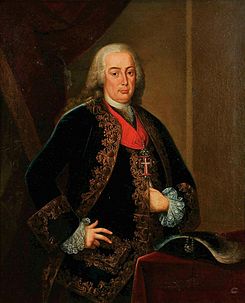Sebastião José de Carvalho e Melo, Marquis of Pombal
|
His Excellency The Marquis of Pombal KC FC |
|
|---|---|
 |
|
| Secretary of State of Internal Affairs of the Kingdom |
|
|
In office 2 August 1750 – 4 March 1777 |
|
| Monarch | Joseph I |
| Preceded by | Gaspar de Moscoso e Silva |
| Succeeded by | Aires de Sá e Melo |
|
Secretary of State of Foreign Affairs and War |
|
|
In office 2 August 1750 – 6 May 1756 |
|
| Monarch | Joseph I |
| Preceded by | Azevedo Coutinho |
| Succeeded by | Luis da Cunha Manuel |
| Personal details | |
| Born | 13 May 1699 Lisbon, Portugal |
| Died | 8 May 1782 (aged 82) Pombal, Portugal |
| Spouse(s) | Teresa Luísa de Mendonça e Almada Maria Leonor Ernestina Daun |
| Occupation | Politician |
| Signature | |
Sebastião José de Carvalho e Melo, 1st Marquis of Pombal, 1st Count of Oeiras (Portuguese pronunciation: [mɐɾˈkeʃ dɨ põˈbaɫ]; 13 May 1699 – 8 May 1782), popularly known as Marquis of Pombal, was an 18th-century Portuguese statesman. He was Secretary of the State of Internal Affairs of the Kingdom (the equivalent of a Prime Minister today) in the government of Joseph I of Portugal from 1750 to 1777. Undoubtedly the most prominent minister in the government, he is considered to have been its de facto head. Pombal is notable for his swift and competent leadership in the aftermath of the 1755 Lisbon earthquake. He implemented sweeping economic policies in Portugal to regulate commercial activity and standardise quality throughout the country, and was instrumental in weakening the grip of the Inquisition. The term Pombaline is used to describe not only his tenure, but also the architectural style adopted in Lisbon after the great earthquake.
Pombal, who was considered an estrangeirado, introduced many fundamental administrative, educational, economic, and ecclesiastical reforms justified in the name of "reason" and instrumental in advancing secularisation in Portugal. However, historians argue that Pombal's implementation of the ideas of the "Enlightenment", while far-reaching, was primarily a mechanism for enhancing autocracy at the expense of individual liberty and especially an apparatus for crushing opposition, suppressing criticism, and furthering colonial economic exploitation as well as intensifying print censorship and consolidating personal control and profit.
Sebastião José de Carvalho e Melo (Portuguese pronunciation: [sɨbɐʃtiˈɐ̃w̃ ʒuˈzɛ dɨ kɐɾˈvaʎu i ˈmɛlu]) was born in Lisbon, the son of Manuel de Carvalho e Ataíde, a country squire with properties in the Leiria region, and of his wife Teresa Luísa de Mendonça e Melo. During his youth he studied at the University of Coimbra and then served briefly in the army. He then moved to Lisbon and eloped with Teresa de Mendonça e Almada (1689–1737), the niece of the Count of Arcos. The marriage was a turbulent one, as she had married him against her family's wishes. Her parents made life unbearable for the young couple; they eventually moved to Melo properties near Pombal.
...
Wikipedia
